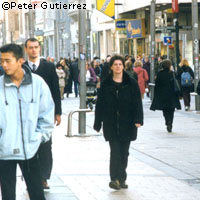European Group on Humanities delivers FP7 verdict
The European Commission has done a lot to encourage the participation of humanities researchers in the Seventh Framework Programme (FP7), but more still needs to be done, according to the final report of the Expert Group on the Humanities (EGH). FP7 represents the first time that a European research framework programme has had an entire theme (Theme 8) dedicated to the socio-economic sciences and humanities. Previous framework programmes have made some funding available to humanities projects, but they aroused little interest from the humanities research community. This is unfortunate, because as the group points out, humanities research can shed light on issues such as European integration and other challenges in society. 'Humanities scholarship is a resource that is underutilised with respect to the Lisbon Agenda and other policy agendas,' they write. In a bid to ensure a high level of participation from the humanities community under FP7, in early 2006 the Commission set up the EGH to help it draw up the FP7 work programme. The 11-strong group, chaired by Professor Wolfgang Mackiewicz of the Free University of Berlin, advised the Commission on how framework programme instruments could be adapted to humanities disciplines and how key concepts of EU collaborative research could be used by humanities researchers in their proposals. The group also helped the Commission to adopt a more 'humanities friendly' terminology in the work programme. As it comes to the end of its term of office, the group notes that the Commission has already taken on board most of its comments. For example, the language used in the work programmes has been improved, and the programme emphasises the broad role humanities researchers could play. The report finishes with a set of recommendations for the future. These include calls for further efforts to make descriptions of some of the topics more humanities friendly, and a suggestion that the Research Directorate-General of the Commission should showcase successful applications submitted by humanities-led consortia. They also note that 'in view of the fact that Member States and individual institutions are seeking to stimulate collaboration between the humanities and the hard sciences, DG Research should make a stronger effort to arouse the interest of humanities researchers in other Themes of FP7'. Other pointers for the future concern the importance of strengthening outreach activities in DG Research and the need to educate young humanities researchers about collaborative, policy-oriented research. Finally, they call for the establishment of a more permanent expert group on the humanities to accompany further development of this thematic area, and states that DG Research should ensure that all evaluation panels connected to topic should include representatives of the humanities disciplines. Ultimately, the expert group is optimistic that participation in the framework programme will be good for the humanities. 'While there can be no doubt that Theme 8 presents a major challenge for humanities researchers, it also constitutes a unique opportunity for them to make a genuine contribution to the further development of European society and societies,' they write. 'Seen in this way, Theme 8 presents a strong encouragement to the humanities research community to reflect on its role in, its relevance to, and its potential impact on society.'



